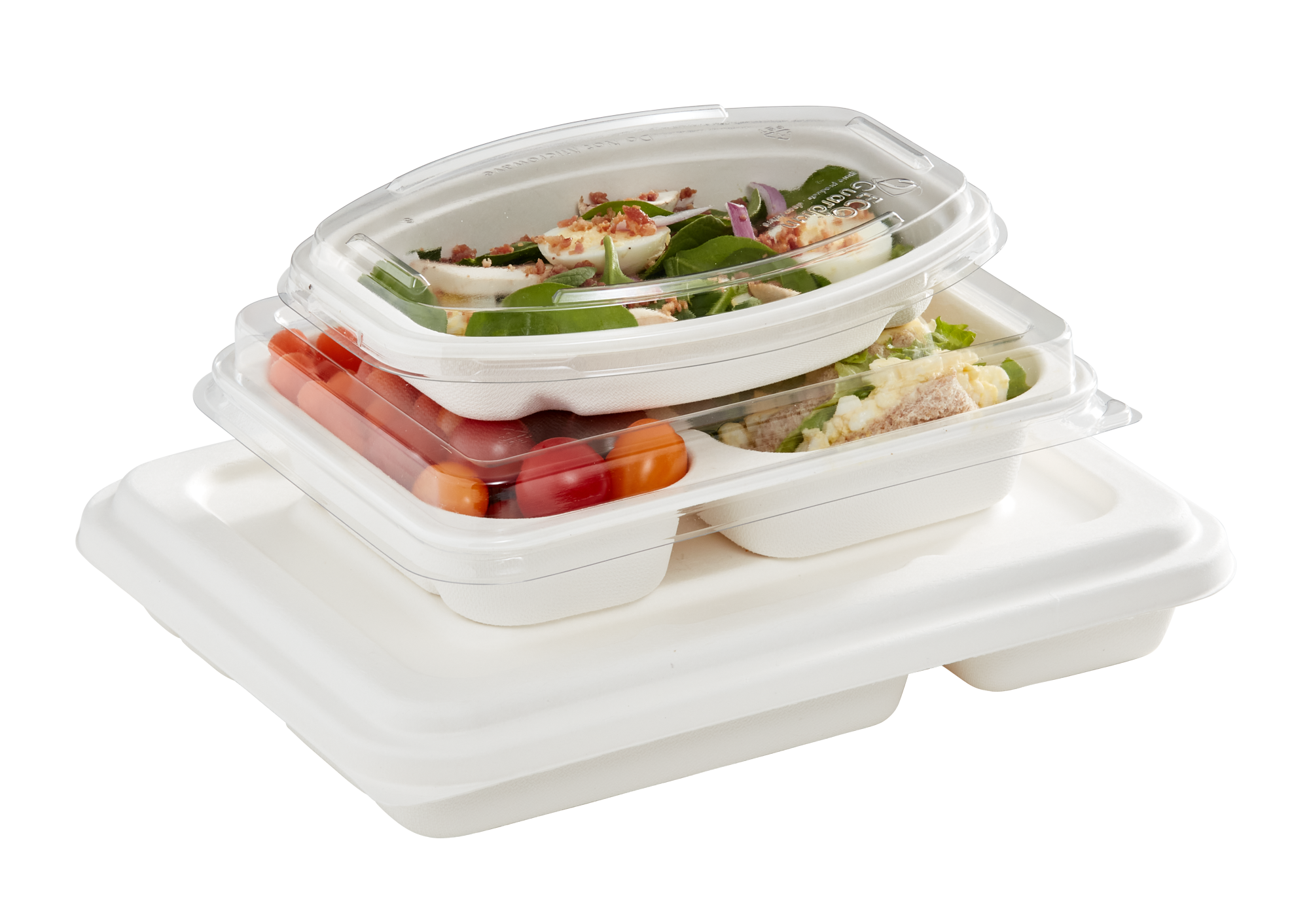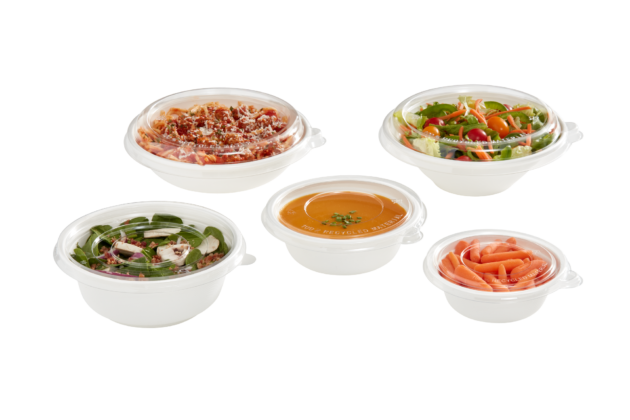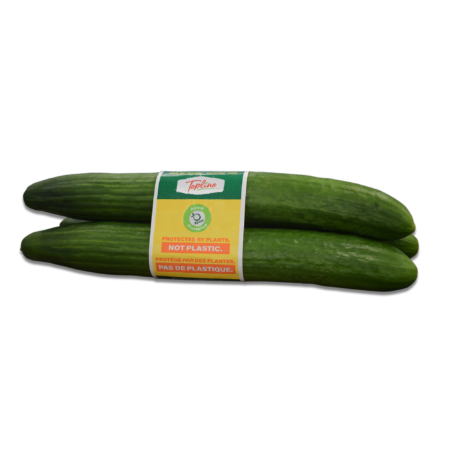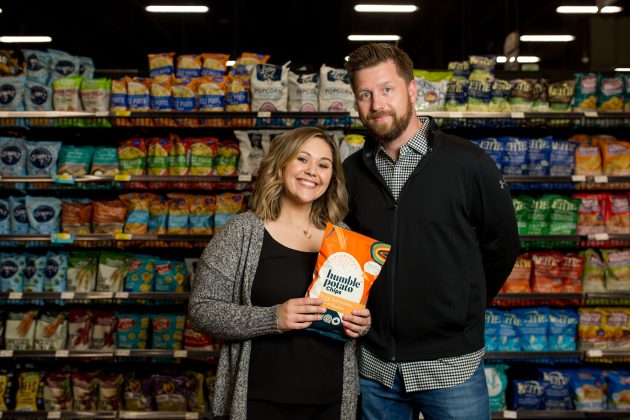
The shift to plastic-free packaging
By Treena Hein
Packaging Eco Guardian Editor pick Sobey's sustainabilityExpect to see more alternative options for your products

Over the last year, Eco Guardian, a food and beverage packaging firm based in Newmarket, Ont., has doubled its growth.
Yes, other packaging makers also increased business over the past year or so, largely due to the huge uptick in demand for take-out food during the pandemic. However, Eco Guardian is also growing for another reason—its plastic-free packaging options.
“We have warehouses in Vancouver and Toronto and offer about 150 plastic-free products,” says CEO Anil Abrol, who founded Eco Guardian in 2004. “We sell about 50 million individual pieces a year in Canada, the U.S. and Mexico, and it’s growing. We have various clamshells, trays and other packages for meat, fruit, and vegetables in retail, and trays for single-meal products that can go from the refrigerator or freezer to the microwave or oven up to 375 F and back again. We recently also launched wooden and fibre cutlery and a very large Canadian retailer will be distributing them.” Eco Guardian also offers larger single-use trays for food service applications.
This packaging—made from sugarcane and bamboo fibres—recently won the Plastic Waste Challenge launched by grocery chain Sobeys in March to find viable alternatives for existing meat and seafood tray packaging.
Eco Guardian has received a $25,000 cash prize from Sobeys along with a pilot project in select Sobeys stores in Nova Scotia (for which Divert NS is also contributing up to $25,000). Winning the challenge also brings support from Ignite Atlantic and the Atlantic Canada Opportunities Agency.

Eco Guardian’s packaging is made from sugarcane and bamboo fibres. Photo courtesy Eco Guardian
An inside look
Whether you use sugarcane or bamboo fibre, which have similar properties, the process to make this type of packaging follows a simple course. Sugarcane fibre left over from juice extraction, or bamboo fibre processed specifically for packaging or paper/cardboard products, is processed into pulp. Sheets of pulp are generally manufactured in Thailand, China, and Vietnam. To make packaging from them, you add small amounts of oil-resistant material and mold them into various shapes with heat.
In terms of raw material availability, Abrol explains that sugarcane fibre is made into pellets for heating, running industrial processes and so on, or discarded. Therefore, sourcing more pulp is not an issue as demand for this type of packaging grows.
Indeed, Eco Guardian is not alone in making sugarcane and bamboo packaging. “It’s a competitive market, but we are a leader,” says Abrol. “I say that because of our customization of products. You can’t always create products that will replace the plastic, but we work with customers where it can be done to create exactly what they need. We also make paper-, wood-, and bamboo-based products with a thin plant-based lining called PLA. The functionality of this packaging is often better than the plastic it’s replacing.”
For Sobeys, Abrol and his team proposed three solutions for meat and seafood trays in four to six sizes: a simple tray, a tray lined with PLA and what they’ve dubbed the ‘Sensu,’ a double tray with a compostable soaking pad.

Apeel uses materials in the peels, seeds and pulp of fruits and vegetables to create a protective coating that seals in moisture and keeps oxygen out. Photo courtesy Apeel
No more plastic for produce?
In the produce aisle, some Canadians in Eastern Canada are buying cucumbers without plastic wraps. Apeel incorporates materials that exist in the peels, seeds and pulp of fruits and vegetables into a protective coating that seals in moisture and keeps oxygen out.
“Our cucumbers last equally as long as cucumbers wrapped in single-use plastic, while slowing rot and maintaining a cucumber’s firmness and colour,” says Ravi Jolly, Apeel vice-president of new product introduction. “And here’s a fun fact: If we replaced plastic for all greenhouse-grown cucumbers produced in Canada last year, we would avoid the use of over 800 metric tons of plastic, or the equivalent of almost 2 billion plastic straws.”
English cucumbers in Apeel plant-based coating were launched in June 2022 in a pilot program at retail stores in the Ontario region, explains Jolly.
“Our retail partner is currently monitoring category performance, and we’re looking forward to seeing initial data early this fall,” he says. “However, in the first month of the campaign, we’ve seen strong performance and a positive response from store employees and shoppers and are confident in our abilities to expand the availability of plastic-free cucumbers nationwide.”
Apeel has actually been available since 2019 in North America on other produce, such as avocados, organic apples and limes.

Humble Potato Chips offers five flavours in plant-based plastic-free compostable bags. Photo courtesy the Humble Potato Chips
Snacking plastic-free
Taking a stroll down the snack aisle, there’s been a new option in Canada since early 2022, when Ontario-based Humble Potato Chips launched five flavours (original, Sea Salt and Cider Vinegar, BBQ, Creamy Dill, and Honey Mustard) in plant-based plastic-free compostable bags. “We are now selling in 1000 stores from coast to coast across Canada, online, independents and chains such as Whole Foods, Loblaws and IGA, Well.ca and Spud.ca,” says Alicia Lahey, co-founder.
Lahey and her team worked on commercializing their packaging for over four years and tested eight different versions. She also explains, “Originally, the packaging was way too expensive. Over the last three years, the technology has advanced quickly and the demand for sustainable packaging options have rapidly increased. The cost of plastic-free packaging came down to a place where we could make it work to have a product on shelf that is competitively priced with other snack brands.”
A look at the supply chain
Companies are also going beyond using plastic as their end-product packaging where possible and cutting down plastic used in the supply chain for their raw ingredients.
Ari Davis, co-founder of Simpla Foods in Ontario (which sells coconut milk-based yogurt in glass containers) gives the example of wrapped skids, where generally 4.4 kg of plastic is used for each one.
“We are trying our best to look at every element and every raw ingredient in our supply chain in order to minimize the plastics that we use as a company,” says Davis. “We source our maple syrup locally and ensure the jugs are returned for re-use. We buy our cocoa powder in bulk and direct trade to ensure it hasn’t been repackaged.”
Simpla has also achieved ‘Plastic Neutral’ certification from RePurpose Global, which means it funds the collection and ethical processing of as much plastic waste found in nature as it uses along the supply chain.
What’s ahead
The federal government recently announced a ban on single-use plastics, but in early August a group of plastics companies known as the Responsible Plastic Use Coalition sought an end to the ban in court. This follows a first lawsuit filed in 2021 to overturn the government’s decision to designate plastics as ‘toxic’ under the Canadian Environmental Protection Act.
This seems strange, as Canadians eat food that’s stored or even heated in plastic packaging every day. While more alternatives to plastic are expected to emerge for packaging food and beverages, we must remind ourselves that all types of packaging require energy (heat and electricity) consumption for processing, and for transportation of both the raw materials to make the packaging and the packaging itself to end users (other companies, retailers, food service and so on). Every bite of food we eat, including the packaging, has an environmental impact.
For his part, Abrol notes packaging alternatives to plastic still come with a price premium, but come companies are accepting this in order to be more sustainable.
However, he adds that as use of alternatives grows, “the prices may come down. One thing that’s certain is that we are at the tip of the iceberg to displace plastic, and leaders like Sobeys are helping speed adoption. Consumers, food processors, retailers, and food service are all looking for a change. Companies are taking bold steps, organizations are working together and it’s going well.”
This article was originally published in the October 2022 issue of Food in Canada.
Print this page